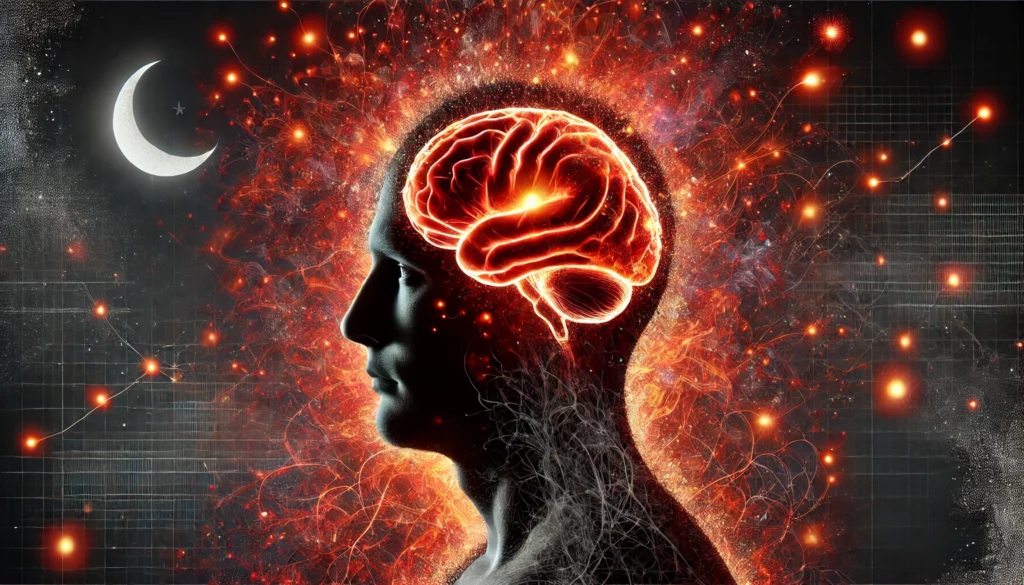Sleep is often overlooked as a vital component of our health and well-being. Despite its importance, many people find themselves sacrificing sleep in favor of work, social activities, or screen time. However, the consequences of sleep deprivation extend far beyond mere fatigue.
This article explores the multifaceted dangers of sleep deprivation, providing insights into how lack of rest can affect your brain and overall health. We’ll delve into the science of sleep, the historical context of sleep studies, and the future implications of chronic sleep deprivation. Through a deeper understanding of these aspects, we can better appreciate the critical role of sleep in our lives and take actionable steps to safeguard our health.
You May Also Like: Understanding the Impact of Chronic Sleep Deficiencies
What Happens to Your Brain Without Sleep?
The Science Behind Sleep and Brain Maintenance
Sleep is not just a passive state; it is an active period for brain maintenance and recovery. During sleep, the brain undergoes crucial processes, such as memory consolidation, toxin clearance, and synaptic plasticity. These processes are vital for maintaining cognitive function and overall brain health. Understanding the fundamental science behind these activities highlights why sleep is indispensable for optimal brain performance.
Does Your Brain “Eat Itself” Without Sleep?
The phrase “does your brain eat itself without sleep” might sound like hyperbole, but it has a basis in scientific research. A study conducted by neuroscientists at the Marche Polytechnic University in Italy found that astrocytes, the brain’s support cells, become more active in sleep-deprived mice. These cells start to break down and “clean up” synapses, a process that is typically beneficial. However, chronic sleep deprivation leads to excessive pruning of these connections, akin to a gardener over-trimming plants.
This self-cannibalization highlights the brain’s desperation to maintain function without adequate rest, but it may also lead to detrimental effects on cognitive function and overall brain health. The study’s implications suggest that chronic sleep deprivation could contribute to cognitive decline and neurodegenerative diseases. The excessive pruning might hinder the brain’s ability to recover and adapt, emphasizing the importance of consistent, restorative sleep.
The Impact on Memory and Learning
Lack of sleep impacts various cognitive functions, including memory, attention, and decision-making. Without sufficient rest, the brain struggles to consolidate memories, which is crucial for learning new information. Sleep is when the brain processes and stores experiences from the day, allowing for efficient retrieval of this information when needed. Interruptions in this process can lead to forgetfulness and difficulty in learning new tasks.
Moreover, sleep deprivation affects the prefrontal cortex, the area responsible for complex cognitive behavior, personality expression, decision-making, and moderating social behavior. When sleep is compromised, the brain’s ability to perform these functions diminishes, impacting daily life and productivity. This impairment can have ripple effects, affecting academic performance, work efficiency, and personal relationships.
Cognitive Impairment Equated to Intoxication
Chronic sleep deprivation can impair your ability to concentrate, leading to mistakes and accidents. Studies have shown that sleep-deprived individuals perform tasks with the same level of impairment as someone who is legally intoxicated. This comparison underscores the severity of sleep deprivation’s impact on cognitive function.
The similarity to intoxication is not just about impaired motor skills but extends to judgment and decision-making capabilities. Sleep-deprived individuals may struggle with problem-solving and exhibit poor impulse control, leading to risky behaviors. Recognizing this parallel can help promote safer practices and policies, particularly in industries where attention to detail and quick thinking are paramount.

The Broader Health Implications of Sleep Deprivation
Hormonal Disruptions and Weight Gain
Beyond the brain, sleep deprivation poses significant risks to physical health. It disrupts the body’s hormonal balance, leading to increased hunger and cravings, particularly for high-calorie foods. Hormones like ghrelin and leptin, which regulate hunger and satiety, are affected by lack of sleep. This disruption is closely linked to obesity, diabetes, and cardiovascular diseases. The hormonal imbalance can create a cycle of overeating and weight gain, further exacerbating sleep issues.
Weakened Immune System and Inflammation
Sleep deprivation also weakens the immune system, making you more susceptible to infections. The body’s ability to fight off viruses and bacteria diminishes without adequate rest, increasing the risk of illness. Additionally, chronic lack of sleep has been associated with increased inflammation, which is a precursor for numerous chronic conditions. Inflammation is a natural response to injury or infection, but when it becomes chronic, it can lead to diseases such as arthritis, heart disease, and even cancer.
Mental Health Consequences
The relationship between sleep and mental health is bidirectional. Poor sleep can contribute to the onset and worsening of mental health conditions, such as depression and anxiety. Conversely, these conditions can exacerbate sleep problems. Individuals suffering from sleep deprivation often experience mood swings, irritability, and heightened stress levels. The lack of restorative sleep can also lead to feelings of hopelessness and exhaustion, further compounding mental health challenges.
Understanding this complex relationship is crucial for effective treatment and management of mental health conditions. Therapeutic approaches that address both sleep and mental health can lead to more successful outcomes. Encouraging healthy sleep habits alongside mental health support can create a positive feedback loop, promoting overall well-being.
Historical Context: The Evolution of Sleep Studies
Early Discoveries and Milestones
The scientific exploration of sleep dates back to the early 20th century, with significant advancements occurring in the latter half of the century. Researchers began identifying different sleep stages and their characteristics, laying the groundwork for modern sleep science. The discovery of REM (Rapid Eye Movement) sleep in the 1950s revolutionized our understanding of sleep cycles and their importance. REM sleep was found to be critical for emotional regulation and memory consolidation.
The Role of Sleep in Physiological Processes
Since then, the field has expanded, exploring sleep’s role in various physiological processes and its impact on health. Research has consistently underscored the necessity of sleep for maintaining cognitive and physical well-being. Studies have linked sleep with metabolic function, cardiovascular health, and immune response, highlighting its integral role in overall health. This growing body of evidence has shifted the perception of sleep from a passive state to an active and essential component of life.
Current Trends in Sleep Research
Today, sleep research is at the forefront of neuroscience and psychology, leveraging advanced technology to uncover the mysteries of sleep. Studies using functional MRI and other imaging techniques have provided insights into how sleep affects brain connectivity and function. Researchers are now able to observe real-time changes in brain activity during different sleep stages, offering a deeper understanding of sleep’s restorative functions.
Moreover, the rise of wearable technology has enabled individuals to track their sleep patterns, providing valuable data for both personal health and broader research initiatives. These devices offer a practical way to monitor sleep quality and duration, empowering individuals to make informed decisions about their sleep habits. The data collected from these technologies also contribute to large-scale studies, helping to identify trends and correlations in sleep behavior.

Practical Advice for Improving Sleep Quality
Designing an Optimal Sleep Environment
To combat sleep deprivation, it’s essential to establish a conducive sleep environment. This includes maintaining a cool, dark, and quiet bedroom, investing in a comfortable mattress, and minimizing exposure to screens before bed. The bedroom should be a sanctuary for rest, free from distractions and stressors. Consider using blackout curtains and white noise machines to create a calming atmosphere.
Establishing a Consistent Sleep Routine
Consistency is key when it comes to sleep. Aim to go to bed and wake up at the same time every day, even on weekends. This helps regulate your body’s internal clock, making it easier to fall asleep and wake up naturally. A consistent routine reinforces the sleep-wake cycle, promoting more restful and restorative sleep. Over time, your body will adapt, making it easier to get the rest you need.
Mindfulness and Relaxation Techniques
Incorporating mindfulness practices, such as meditation or deep breathing exercises, can help reduce stress and promote relaxation before bed. These techniques can also improve overall sleep quality and duration. Mindfulness encourages a state of relaxation, helping to quiet the mind and prepare the body for sleep. Regular practice can lead to long-term improvements in sleep patterns and mental well-being.
The Importance of Limiting Stimulants
Reducing the intake of caffeine and other stimulants, especially in the hours leading up to bedtime, is crucial for improving sleep quality. Caffeine can interfere with the body’s natural sleep processes, leading to difficulty falling asleep and staying asleep. Being mindful of your consumption and timing can help minimize its impact on your sleep.
Future Implications: The Impact of Chronic Sleep Deprivation
Long-term Health Risks and Neurodegenerative Diseases
As our understanding of sleep deprivation grows, so does the awareness of its long-term implications. The modern lifestyle, with its emphasis on productivity and constant connectivity, poses a significant challenge to achieving adequate rest. Chronic sleep deprivation can lead to neurodegenerative diseases, such as Alzheimer’s and Parkinson’s, as well as exacerbate existing health conditions. These diseases are often characterized by cognitive decline and memory loss, which are compounded by inadequate sleep.
Societal and Economic Consequences
The societal and economic impacts of sleep deprivation are profound. Reduced productivity, increased healthcare costs, and higher accident rates are all consequences of widespread sleep deprivation. Addressing sleep issues on a societal level can lead to significant improvements in public health and economic stability. Encouraging policies that promote healthy sleep habits can have far-reaching benefits, from reducing workplace accidents to lowering healthcare expenditures.
Prioritizing Sleep as a Health Imperative
Recognizing sleep as a fundamental pillar of health is crucial for preventing these outcomes and promoting overall well-being. By prioritizing sleep, individuals and societies can enhance quality of life and prevent chronic health issues. Education and awareness campaigns can play a vital role in shifting perceptions and encouraging healthier sleep practices.

Conclusion
Sleep deprivation is a pervasive issue with far-reaching consequences for both mental and physical health. By understanding the science behind sleep and its effects, we can take proactive steps to prioritize rest and improve our quality of life. Whether you’re a health and wellness coach, a science journalist, or a biohacker, incorporating the latest insights and strategies into your routine can help mitigate the dangers of sleep deprivation and promote a healthier, more balanced lifestyle. Prioritizing sleep is not just about individual health but also about fostering a healthier, more productive society.
Further Reading:
The brain starts to eat itself after chronic sleep deprivation
The Neuroprotective Aspects of Sleep
The sleep-deprived human brain
Important Note: The information contained in this article is for general informational purposes only, and should not be construed as health or medical advice, nor is it intended to diagnose, prevent, treat, or cure any disease or health condition. Before embarking on any diet, fitness regimen, or program of nutritional supplementation, it is advisable to consult your healthcare professional in order to determine its safety and probable efficacy in terms of your individual state of health.
Regarding Nutritional Supplements Or Other Non-Prescription Health Products: If any nutritional supplements or other non-prescription health products are mentioned in the foregoing article, any claims or statements made about them have not been evaluated by the U.S. Food and Drug Administration, and such nutritional supplements or other health products are not intended to diagnose, treat, cure, or prevent any disease.


